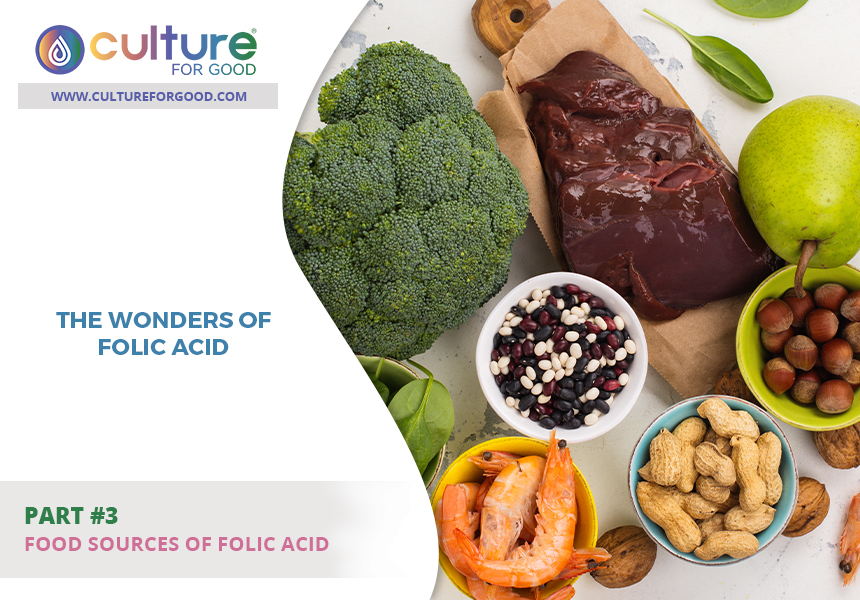The Wonders Of Folic Acid
Do you know how much folic acid you should be getting in your diet? Most of us don’t, and it can be hard to determine the right amount. Without enough folic acid, we are at risk of a variety of health issues, including birth defects, heart disease, stroke, and certain types of cancer.
Fortunately, there is an easy way to make sure that you’re getting the right amount – by eating a diet rich in folic acid-rich foods, such as leafy green vegetables, fruits, fortified cereals, beans, lentils, chickpeas, and nuts, along with taking dietary supplements if needed. Consulting with a healthcare professional can also help determine the right amount for your specific needs. In this article, we will discuss why the adequate intake of folic acid is important and how to ensure that you get enough!

1Introduction
Folic acid, also known as vitamin B9, is a water-soluble vitamin that plays a vital role in many of the body’s functions. It is essential for proper brain function, the production of red and white blood cells, and the synthesis of DNA. Folic acid can be found in a variety of foods, including leafy green vegetables, beans, and nuts, and is also available as a dietary supplement. In addition to its many other benefits, folic acid has been shown to reduce the risk of birth defects and may play a role in the prevention of certain types of cancer and heart disease. It is critical to ensure that you are getting an adequate intake of folic acid to support optimal health.
Folic acid is crucial for proper brain function, as it plays a key role in the production of neurotransmitters and in the development and maintenance of the nervous system. Adequate intake of folic acid is significant for cognitive function, including memory and concentration. It is also involved in the production of serotonin, a neurotransmitter that regulates mood and is critical for mental health.
In addition to its role in brain function, folic acid is also significant for the production of red and white blood cells. Red blood cells transport oxygen throughout the body, while white blood cells help fight off infections. Folic acid is necessary for the production of both types of blood cells and is especially vital during periods of rapid growth, such as in infancy, adolescence, and during pregnancy. Folic acid is also necessary for the synthesis of DNA, the genetic material found in all cells. It is vital for the proper replication and repair of DNA, which helps ensure the accuracy of genetic information and maintain the integrity of cells.

2Benefits Of Folic Acid
Blood Production
One of the primary benefits of folic acid is its role in the production of red and white blood cells. Red blood cells are responsible for carrying oxygen from the lungs to the rest of the body, while white blood cells help fight off infections. Folic acid is necessary for the production of both types of blood cells and is especially critical during periods of rapid growth, such as during infancy, adolescence, and pregnancy.
Deficiencies in folic acid can lead to anemia, a condition in which there are not enough red blood cells to carry oxygen to the body’s tissues. Symptoms of anemia can include fatigue, weakness, and difficulty concentrating. Ensuring an adequate intake of folic acid can help prevent anemia and maintain the health of the blood cells.
Brain Function
Folic acid is also crucial for proper brain function, as it plays a key role in the production of neurotransmitters and in the development and maintenance of the nervous system. Adequate intake of folic acid is significant for cognitive function, including memory and concentration. It is also involved in the production of serotonin, a neurotransmitter that regulates mood and is critical for mental health.
Studies have shown that low levels of folic acid may be linked to an increased risk of cognitive decline and dementia, including Alzheimer’s disease. In addition, folic acid has been shown to improve symptoms in individuals with depression and anxiety. Ensuring an adequate intake of folic acid may help support cognitive function and mental health.
Pregnancy
Folic acid is also essential during pregnancy, as it plays a role in fetal neural tube development. Adequate intake of folic acid before and during early pregnancy has been shown to reduce the risk of neural tube defects, such as spina bifida. It is recommended that women who are pregnant or planning to become pregnant consume an adequate amount of folic acid to support the health of both the mother and the developing fetus. One of the key benefits of folic acid is its ability to reduce the risk of birth defects.
Folic acid is essential for proper neural tube development, and adequate intake of folic acid before and during early pregnancy has been shown to reduce the risk of neural tube defects, such as spina bifida. The neural tube forms early in pregnancy and eventually becomes the brain and spinal cord. If the neural tube does not close properly, it can result in a birth defect.
Adequate intake of folic acid before and during the first few weeks of pregnancy, when the neural tube forms, can help prevent these defects. It is recommended that women who are pregnant or planning to become pregnant consume an adequate amount of folic acid to support the health of both the mother and the developing fetus. In addition to reducing the risk of birth defects, folic acid may also help reduce the risk of pre-term delivery and low birth weight.
Heart Health
Folic acid may also play a role in the prevention of heart disease and stroke. Studies have shown that individuals with low levels of folic acid are at an increased risk of cardiovascular disease. In addition, folic acid has been shown to lower levels of homocysteine, an amino acid that has been linked to an increased risk of heart disease.
Folic acid may also help lower blood pressure and improve endothelial function, which is the function of the inner lining of blood vessels. Adequate intake of folic acid may help reduce the risk of heart disease and stroke by maintaining healthy blood pressure and blood vessel function. It is significant to note that while folic acid may play a role in the prevention of heart disease and stroke, it is not a substitute for other heart-healthy lifestyle habits, such as a healthy diet, regular physical activity, and not smoking.
Cancer Prevention
Folic acid may also play a role in cancer prevention. Studies have shown that individuals with low levels of folic acid may be at an increased risk of certain types of cancer, such as colorectal cancer. Adequate intake of folic acid may help reduce the risk of cancer by maintaining healthy DNA function and cell growth.
Some studies have also suggested that folic acid may also help reduce the risk of breast cancer, especially for women who have a family history of the disease or carry certain genetic mutations that increase the risk. It is worth mentioning that folic acid intake alone might not be sufficient to prevent cancer. But it is one significant factor among the many other protective behaviors that can contribute to the risk reduction of certain types of cancer.

3Food Sources Of Folic Acid
Folic acid can be found in a variety of foods. These include leafy greens, vegetables such as broccoli, asparagus, and Brussels sprouts, fruits such as oranges, fortified cereals, bread, beans, lentils, chickpeas, and nuts. Some examples of foods that are high in folic acid are listed below.
Spinach and other leafy greens: One cup of cooked spinach contains 58 mcg of folic acid.
Beets: A cup of boiled beets contains 136 mcg of folic acid.
Broccoli: A cup of cooked broccoli contains 51 mcg of folic acid.
Lentils: A cup of cooked lentils contains 358 mcg of folic acid.
Orange juice: One cup of orange juice contains 67 mcg of folic acid.
Fortified cereal: Many fortified kinds of cereal contain 100 percent of the daily value (DV) of folic acid per serving.
Additionally, folic acid can also be taken as a dietary supplement. You can take it either as a standalone supplement or as a part of a multivitamin. Some supplements may contain a higher amount of folic acid than the Recommended Dietary Allowance (RDA) for adults, which is 400 mcg.
Eating a diet that is rich in folic acid-rich foods, along with taking dietary supplements if needed, is an easy way to ensure that you’re getting an adequate intake of folic acid to support optimal health. One way to increase folic acid intake through diet is by adding more leafy green vegetables, beans, and nuts to your meals or by incorporating a breakfast cereal or orange juice as a source of folate. Cooking methods such as boiling, steaming, or microwaving may lead to loss of vitamins during the cooking process, so aiming to eat vegetables in raw or minimally cooked form may increase the bioavailability of the vitamin.

4Daily Intake
The recommended daily intake of folic acid for adults is 400 micrograms (mcg) per day for men and women. This amount is easily achievable through diet and supplements, which can also be helpful for people with dietary restrictions or special needs. Additionally, women who are pregnant or planning to become pregnant should consume 600 to 800 mcg of folic acid daily, as it helps prevent birth defects in the baby’s brain and spine.
It is crucial to note that this recommended intake is a general guideline and may vary depending on an individual’s specific needs. There are several factors that can affect the recommended daily intake of folic acid for an individual. These include age, pregnancy, and certain medical conditions or medications.
Age is an important factor in determining the recommended daily intake of folic acid. Infants and children have different nutritional needs than adults, and their recommended intake of folic acid will be different as well. Adolescents and pregnant women, for instance, have increased needs for folic acid.
Pregnancy is another factor that can affect the recommended daily intake of folic acid. Pregnant women should consume 600 to 800 mcg of folic acid daily in order to prevent birth defects in the baby’s brain and spine. Women who are planning to become pregnant should also consume this amount to ensure that they have enough folic acid before they get pregnant.
Certain medical conditions and medications can also affect the recommended daily intake of folic acid. For example, people with certain genetic disorders, such as MTHFR deficiency, may require higher doses of folic acid to maintain normal blood levels. Similarly, some medications, such as methotrexate, used for cancer and autoimmune disease, can decrease the absorption of folic acid and may require higher doses. It’s important to consult a healthcare professional to determine the right amount of folic acid for your specific needs. Consuming too much folic acid can also be harmful, especially if you have a medical condition that can be affected by it.

Conclusion
Folic acid is a vital nutrient that plays critical roles in many of the body’s functions, including brain function, blood cell production, and DNA synthesis. Ensuring an adequate intake of folic acid is important for optimal health and well-being. Some of the key benefits of folic acid include its role in the production of red and white blood cells, essential for proper brain function, reducing the risk of birth defects, and potentially playing a role in the prevention of heart disease, stroke, and certain types of cancer.
Adequate intake of folic acid is important during pregnancy to prevent birth defects and for women planning to become pregnant to ensure enough folic acid before conception. It is also important for women and men at any age for proper brain function, blood cell production, and DNA synthesis. It is achievable through diet and supplements, but it is crucial to consult with a healthcare professional to determine the right amount of folic acid for your specific needs.
Folic acid can be found in a variety of foods, including leafy green vegetables, fruits, fortified cereals, beans, lentils, chickpeas, and nuts. Eat a diet rich in folic acid-rich foods, along with taking dietary supplements if needed. This is an easy way to ensure that you’re getting an adequate intake of folic acid.
In summary, folic acid is a vital nutrient that plays important roles in many of the body’s functions. Ensuring an adequate intake of folic acid is crucial for optimal health and well-being. It is recommended to consult a healthcare professional to determine the right amount of folic acid for your specific needs and to include folic acid-rich foods in your diet.
In conclusion, folic acid is an essential nutrient that plays many important roles in the body. It is especially important for pregnant women and those planning to become pregnant, as it can help prevent birth defects. However, adequate intake of folic acid is also necessary for proper brain function, blood cell production, and DNA synthesis at any age or stage in life. Eating a diet rich in folic acid-rich foods, along with taking dietary supplements if needed, is an easy way to ensure optimal health and well-being. Consultation with a healthcare professional can be helpful when determining the right amount of folic acid for your specific needs. With this simple solution, you can make sure that you’re getting enough folic acid without compromising on taste!











